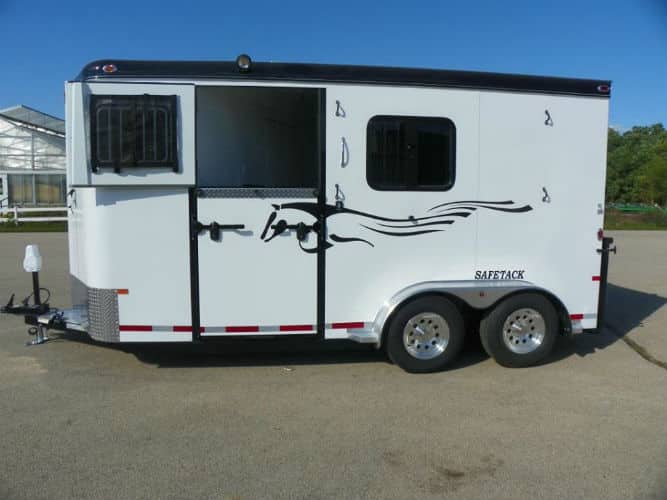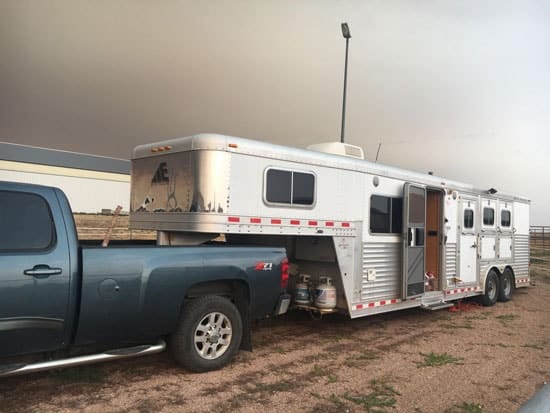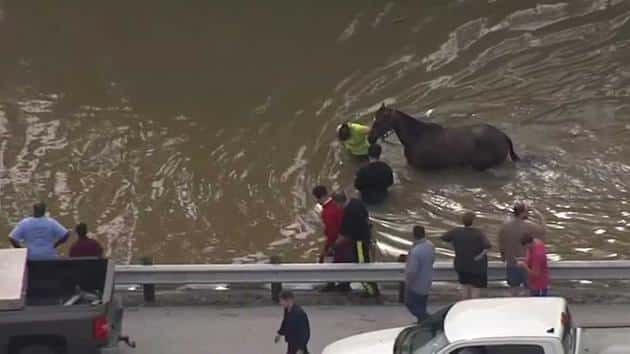Fire & Floods: Prepare Your Horse Farm for Natural Disasters
As the California wildfires continue to rage, the urgency for preparedness has never been clearer.
Back in December of 2017 a wind-driven fire began to threaten the horses stabled at the San Luis Rey Downs training site in California. Horse owners were already starting to move their animals to another facility just to be safe.
They thought they had time…
Within hours, the fire intensified. Horse and humans alike fled for their lives. One trainer suffered severe burns when she tried to rescue her six horses. Despite her efforts, three of them died. In the end, dozens of horses tragically lost their lives.
In places where fire is less of a threat, a different sort of danger looms… water.
Flooding due to major storms has been forefront in our news in recent years. In fact, the 2020 hurricane season broke records all across board. Major flooding in city like Houston, TX showed us what happens when horse owners need to evacuate or rescue threated animals. 2021 is already a busy hurricane season with Hurricane Ida recently ravaging the Northeast.
Scientists have determined that hurricanes aren’t necessarily become more frequent, but they are definitely more severe. This great intensity means more rain, faster development, and longer lasting storms after landfall.
So, what can you – the average horse owner – do about this mess?
Well, you can prepare! The right preparation around your farm can make the difference between disaster and weathering the storm. Here are some of our top tips to keep your farm safe during natural disasters.
Have Your Horse Trailer Ready to Go!

We’ve noticed a huge uptick of purchases from California where horse owners just want to have a trailer ready to evacuate their animas from fires if needed.
Remember, you’ll want to evacuate ALL of your horses. So, if you normally only take one animal out for shows and events, but own three, you’ll want to buy that 3 horse trailer so you have it ready.
Make sure your trailer is well maintained so you can hook up and go at a moment’s notice. The top item on this list is your trailer’s tires. Horse trailer tires often “age out” rather than “wear out.” This is because the damaging effects of the sun will make the tires become brittle and weak over time. The tire might appear to have a great tread, but in reality it’s weakened and primed for a blowout.
That’s why we recommend you have your tires checked regularly. It’s also a great idea to cover your horse trailer or store it indoors so the tires and other rubber components are protected from the sun’s damaging effect.
You’ll also want to make sure your trailer is well stocked with the materials you’ll need in case of an evacuation. You’ll need room for feed, hay, and water to last for several days at the minimum. Make a plan for how to load and store these items on your rig.
Things like a first-aid kit, veterinary numbers, emergency road support, and local boarding facilities where you can take your animals are also good to prepare ahead of time.
Lastly, let’s talk about loading. If your animals give you trouble loading on a horse trailer, now is the time to practice. Even if you don’t take them off the farm very often, you’ll want them to be comfortable loading quickly in case of an emergency.
Often, the type of horse trailer plays a big role in whether or not your animals will feel comfortable walking onto the space. Our patented SafeTack slant load horse trailer solves this problem by providing a wide open rear entry way so the animals can literally walk on and walk off the trailer without ever squeezing into narrow spaces or needing to back.
Honestly, your horse trailer is the MOST important item when it comes to natural disaster evacuation. So have that trailer ready to go when the time comes.
Things to Do BEFORE a Natural Disaster Strikes:
Vaccinations – Make sure your horse is up-to-date on all vaccinations especially illnesses like West Nile Virus and Eastern/Western Encephalitis. Mosquitos increase after any significant rainfall.
- Horse Trailer – As we mentioned above, make sure your horse trailer is in good condition in case you need to use it for evacuation. The tires should be maintained and you’ll need a trailer that can carry all of your horses.
- Coggins Test – A negative coggins test will be needed if you need to cross a state line or keep your horse at a boarding facility.
- Health Certificate – You may need a health certificate to cross state lines while evacuating.
- Identification – Have some sort of identification for your horses. This might be a name tag on a leather halter, a luggage tag braided into their tail, and photos of your horse with proof of ownership.
- Have a Plan – Research potential evacuation routes away from a fire or storm pathway. Make contact with friends or boarding facilities that can take your horse on a temporary basis. Make a judgement call based on the local road conditions. If you get stuck in a traffic jam of cars trying to evacuate, make sure you have enough water on hand for your horses.
- Build with Disaster in Mind – If you live in an area prone to storms and fires, design your facility to withstand these events. Strong barn construction, proper drainage for water, and removing flammable undergrowth around your property can help protect your structures and horses. Have a local fire chief inspect your property for any issues for fire spread or accessibility in advance.
Things to Do If You Stay on Your Farm:
- Board Up Windows – If high winds are expected during a hurricane, board up your windows to protect them from flying debris.
- Leave Horses in the Pasture – If you have good fencing, leave your horses in the pasture so they don’t become trapped in a barn. Keep them away from power lines, trees with shallow roots, or barbed wire/electrical wire fencing.
- Water – Have 12-20 gallons of water ready for each horse per day. Fill garbage cans with plastic bags and fill all water troughs. Have a generator ready to run a well and keep chlorine bleach on hand in case you need to purify water.
- Feed – Store a minimum of 72 hours’ worth of feed and 7 days’ worth of hay to make it through the after effects of a storm or fire.
- Medical Kit – Have an emergency medical kit ready and well stocked.
- Emergency Tools – You may need things like a chainsaw, hammer/nails, fence repair items, or a fire extinguisher.
- Awareness – Things often change very quickly when it comes to natural disasters. So, keep your eyes on the news and be prepared to pack up and go if your situation suddenly warrants an evacuation.
Monitoring news and weather alerts is critical. Natural disasters can escalate rapidly, so having a preparedness plan offers not just safety but peace of mind. For more tips or personalized advice on preparing your horse trailer for evacuation, contact us directly. Remember, preparation today can prevent tragedy tomorrow.


 Vaccinations – Make sure your horse is up-to-date on all vaccinations especially illnesses like West Nile Virus and Eastern/Western Encephalitis. Mosquitos increase after any significant rainfall.
Vaccinations – Make sure your horse is up-to-date on all vaccinations especially illnesses like West Nile Virus and Eastern/Western Encephalitis. Mosquitos increase after any significant rainfall.